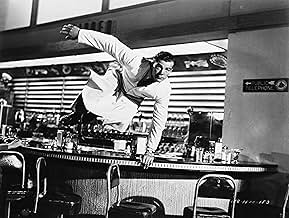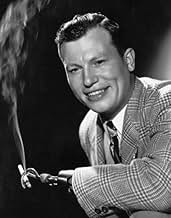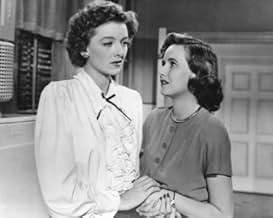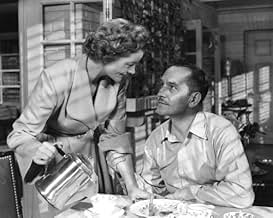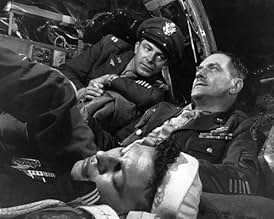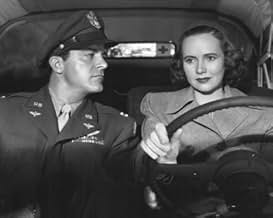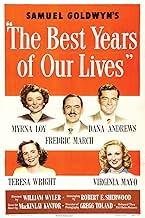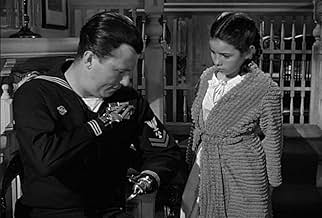Três veteranos da Segunda Guerra Mundial voltam para casa na cidade pequena da América para descobrir que eles e suas famílias foram mudados irreparavelmente.Três veteranos da Segunda Guerra Mundial voltam para casa na cidade pequena da América para descobrir que eles e suas famílias foram mudados irreparavelmente.Três veteranos da Segunda Guerra Mundial voltam para casa na cidade pequena da América para descobrir que eles e suas famílias foram mudados irreparavelmente.
- Direção
- Roteiristas
- Artistas
- Ganhou 7 Oscars
- 25 vitórias e 4 indicações no total
- Al Stephenson
- (as Frederic March)
- Direção
- Roteiristas
- Elenco e equipe completos
- Produção, bilheteria e muito mais no IMDbPro
Resumo
Avaliações em destaque
The whole point of this film when it was released still makes perfect sense today, though I'm sure it doesn't have the same impact it did in those first years after World War II ended. Returning servicemen, with all kinds of backgrounds before and during the war, hit a wall coming home: wives who no longer loved them, jobs that had dried up, a culture that was foreign to them and that found them, these men, to be foreign themselves.
It wasn't a crisis to take lightly. These were the guys who were drafted to fight the enemy, and in going overseas they lost some of the best years of their lives, if not their lives. The country knew its debt in the abstract, but it also knew it in sons and husbands who really did come home and who had to face it all. This movie was both a reckoning for the sake of national healing and a brilliant drama that would be beautifully pertinent and therefore successful. And what a success, then and now.
The consummate Hollywood director William Wyler shows in this fast, long movie just what a master he is at working the medium. With Gregg Toland at the camera, Wyler makes a highly fluid movie, visual and dramatic and weirdly highly efficient. With the three main plots interweaving and depending on each other, the drama (and melodrama) build but never beyond plausibility. Wyler knew his audience wouldn't put up with pandering or cheap mistakes. Casting Harold Russell as Homer, knowing the audience would hear about how Russell really was a soldier who lost both hands in the war, was a huge step toward creating both empathy and credibility. It even practices a key theme in the move--to go beyond your bounds to make a difference, to give these guys a break and help them assimilate.
It's interesting how singular this movie is, trying to show the truth in these kinds of situations. The other post-war films about army and navy men fall into two large and dominating categories--war films and film noir. And it is film noir that comes closest to getting at the problem of the G.I. not reintegrating well, making it a whole style, brooding and spilling over with violence. "The Best Years of Our Lives" has a highly controlled and even contrived plot structure, but it aims to be honest and representative.
That it's remarkable formally--the way it is shot and edited and acted, top to bottom--is not surprise, given the heights that Hollywood had reached by then, and given that Wyler is easily the slickest of them all, in the best sense. That the movie makes such beautiful sense and really works as a story, a moving and heartwarming story without undue sappiness, is a whole other kind of achievement. A terrific, rich, full-blooded, uncompromised movie.
William Wyler's direction is breathtaking. One of the most moving scenes occurs early on in the film, when Homer, the young disabled Navy veteran, arrives at his family home and stands for a moment on the front lawn. For that one second there is an exquisite stillness that communicates a depth of emotion that can't be expressed physically. Then, just as the tension becomes almost unbearable, Homer's little sister Louella comes to the front door and runs out to greet him. In a similar way, the scene where Al Stephenson comes home to his wife and children is so finely directed you can almost feel that you're in the apartment with them--that it's your husband or father come home to you from the war--and you're experiencing the sheer elation of their physical nearness.
This aspect of the film--its portrayal of the joys and hardships of post-war readjustment and the veterans' experience--is what makes it so enlightening, honest and powerful. As a young woman, I have never experienced wartime or had my father, brothers or friends go off to fight. The film moves swiftly but seamlessly from the initial joy of homecoming and reunion to the problems, anxieties and humiliations that the three veterans encounter as they attempt to build a new life for themselves and their families.
I found it interesting how the film tries to give a picture of the different socio-economic backgrounds of the three men, and show the emergence of an affluent, market-driven economy. While this in itself is not bad, different episodes in the film show how this economic approach can conflict sharply at times with enduring human values such as integrity and justice. Al's dealings with the young veteran Mr Novak, who comes to him for a service loan to buy a farm, and his later (slightly tipsy) speech to a business gathering show this. Al declares at the end of his speech that when the bank lends money to poor veterans it will be a financial gamble but "we'll be gambling on the future of this country".
The film's interweaving of the characters and their struggles never falters and is deeply satisfying. Even as Al and Milly, Homer and Wilma gradually move towards a happy resolution of their difficulties this positive strand of the film is counter-balanced by the focus on Fred, the courageous Air Force captain who, in the eyes of the commercial world is "unqualified", suitable only for a job at a soda fountain, and in the eyes of his war bride, Marie, is only wonderful when he's dressed up in his officer's uniform. Fred's situation seems only to deteriorate and at one point in the film, after he farewells his elderly father to leave town and look for work, the father finds the citations for Fred's medals and sits down to read them. As he reads the words describing Fred's bravery and dedication to duty while he was terribly wounded in his aircraft, Pat Derry's voice nearly breaks with pride and love for his son. The film beautifully juxtaposes Fred's unselfish conduct and willingness to make the ultimate sacrifice with the cold indifference of a country in peacetime that does not want him and seemingly has no place for him.
The actors are uniformly impressive and really make their characters come alive. Dana Andrews is especially outstanding together with two young actors making their debut, Harold Russell and Cathy O'Donnell, as Homer and Wilma. Personally, I loved Homer and Wilma's story the best among those of all the characters,and the resolution is a simple, sensitively shot scene that lifts the whole film to a new point of happiness, gratitude and release. Both Cathy O'Donnell and Teresa Wright are lovely, gifted actresses with a slightly understated style, that is perfectly suited to the film's restrained but powerful tenor. This is demonstrated especially well in the tense scene where Wilma tries to talk to Homer in the shed, and in the scene where Peggy confides her heartache to her parents.
One feature that adds significantly to the film's quality is Hugo Friedhofer's score. The music is remarkably fresh and undated, has a strong, classic sound, and is poignant without being too romantic or sentimental (a flaw often found in other 1940s film scores).
The producer, Samuel Goldwyn, reportedly said of this film: "I don't care if it doesn't make a nickel...I just want every man, woman and child in America to see it". Although I'm not American (I am Australian) I found this film, with its universal human themes and its portrayal of post-war readjustment, speaks to anyone who shares in this heritage of WWII. Tell others about this film--it is breathtaking, beautiful and brave. See it and remember.
Such a powerful film. At first the new lives of the soldiers seem to be facing small adjustments, such as their children's interest in "atomic energy" and "scientific efficiency". But soon we find that jobs are hard to find, and the wives and girlfriends sometimes met new people while the battles were fought.
Although a serious topic, the film has the right balance of entertainment and drama. It never gets outright depressing, and things like depression and suicide are overlooked. But it still remains a valuable lesson: as bad as dying in the war is, sometimes the transition back to normalcy can be just as damaging.
Although not one of the better known movies today (2014), "The Best Years of Our Lives" won seven Academy Awards in 1946, including Best Picture, Best Director (William Wyler), Best Actor (Fredric March), Best Supporting Actor (Harold Russell), Best Film Editing (Daniel Mandell), Best Adapted Screenplay (Robert Sherwood), and Best Original Score (Hugo Friedhofer). It still sits on the IMDb Top 250, just as it should.
***** To me watching this movie is like opening up a time capsule. I think in many ways "The Best Years of Our Lives" is probably one of the more fascinating character studies and it holds up extremely well as a look at life in the US in the mid-1940s after WWII. I believe "Coming Home" and "The Deer Hunter", both released in 1978, were the most recent films that were closest in capturing the numerous issues of military men returning from war that were brought up in "The Best Years of Our Lives".
What really impressed me was watching the movie in its entirety when I was in college around 1980-81 and many if not all of the college students applauded at the end of the movie.
This movie still packs a wallop and I'm very happy to read in other posts other users feeling of a movie that will definitely stand the test of time. *****
I'm very happy to see the movie ranked near the top 100 movies on IMDb and AFI. Also, though it was in competition with what eventually became a Christmas classic, It's a Wonderful Life, arguably, The Best Years of Our Lives' Oscar wins, including Best Picture, were very well-deserved.
I've just seen the film again in 2005 and after almost 60 years, The Best Years of Our Lives is still a powerful, beautifully acted and well-crafted motion picture.
And while we don't often learn from history, we can be thankful that for once the United States of America did learn from what happened with its veterans after the previous World War. The GI Bill of Rights is mentioned in passing in The Best Years of Our Lives was possibly the greatest piece of social legislation from the last century. So many veterans did take advantage of it as do the veterans like Fredric March, Dana Andrews, and Harold Russell who you see here.
All three of those actors played archetypal veterans, characters that every corner of the USA could identify with. They all meet on an army transport plane flying to the home town of all of them, Boone City, Iowa.
War is a great leveler of class and distinction. Bank employee March, soda jerk Andrews, and high school football star Russell probably would never meet in real life even in a small town like Boone City. But they do meet and war forges indestructible bonds that can never be broken.
March is the oldest, a man with two children and Hollywood's perfect wife Myrna Loy. He settles in the first and the best. He has some wonderful scenes, getting cockeyed drunk on his return and later with a little bit of liquor in him, tells the bank officials at a banquet off in no uncertain terms.
I also love his scene where another returning veteran, a sharecropper wants to get a bank loan for his own piece of land. Watch March's expressions as he listens to the man's pitch for money. You can feel him read the man's soul. It's what got him his Second Best Actor Oscar for this film.
Harold Russell was a real veteran who lost both his hands during service in the Pacific. He got a special recognition Oscar for his performance. Because of that it was probably unfair to nominate him in the Supporting Actor category which he also won in. His performance, especially his scenes with Cathy O'Donnell as his sweetheart who loves him with or without his hands, is beyond anything that could be described as acting.
Dana Andrews is the only officer of the three, a bombardier in the Army Air Corps. Of the group of them, maybe he should have stayed in. He also comes from the poorest background of the group and he was an officer and a gentleman in that uniform. That uniform and those monthly allotment checks are what got Virginia Mayo interested enough to marry him. The problem is that he's considerably less in her eyes as a civilian.
While Mayo is fooling around with Steve Cochran, Andrews has the great good fortune to have March's daughter Teresa Wright take an interest in him. They're the main story of the film, Andrews adjustment to civilian life and adjusting to the fact he married the wrong woman. Not all veteran's problems were solved with GI Bill.
Myrna Loy gets little recognition for The Best Years of Our Lives. My guess is that it's because her role as wife was too much like the stereotypical wife roles she had patented over at MGM. Still as wife to March and mother to Wright she really is the glue that holds that family together.
The Best Years of Our Lives won for Best Picture for Sam Goldwyn, Best Director for William Wyler and a few others besides the two acting Oscars it got. It was a critical and popular success, possibly the best film Sam Goldwyn ever produced. It remains to this day an endearing and enduring classic and will be so for centuries. It's almost three hours in length, but never once will your interest wane.
The best tribute this film received came from Frank Capra who had a film of his own in the Oscar sweepstakes that year in several categories. In his memoirs he said that he was disappointed to be skunked at the Oscars that year, but that his friend and colleague William Wyler had created such a masterpiece he deserved every award he could get for it.
By the way, the film Capra had hopes for was It's A Wonderful Life. The Beat Years of Our Lives can't get better praise than that.
Oscars Best Picture Winners, Ranked
Oscars Best Picture Winners, Ranked
Você sabia?
- CuriosidadesFor his performance as Homer Parrish, Harold Russell became the only actor to win two Academy Awards for the same role. The Academy Board of Governors thought he was a long shot to win, so they gave him an honorary award "for bringing hope and courage to his fellow veterans through his appearance." Later in the ceremony, he won for Best Supporting Actor.
- Erros de gravaçãoWhen Al introduces his wife and daughter to Fred and Homer at Butch's, he refers to Dana Andrews as Homer and Harold Russell as Fred. This was intended as a consequence of Al being drunk.
- Citações
[after Peggy tells her parents that they never had any trouble in their relationship]
Milly Stephenson: "We never had any trouble." How many times have I told you I hated you and believed it in my heart? How many times have you said you were sick and tired of me; that we were all washed up? How many times have we had to fall in love all over again?
- Cenas durante ou pós-créditosThe character played by Ray Teal (the Axis sympathizer whom Homer Parrish attacks at the soda fountain) is listed in the credits as "Mr. Mollett". However, the character's name is never mentioned or otherwise alluded to.
- Versões alternativasThe film was modified to play on a wide screen and reissued on February 3, 1954.
- ConexõesEdited into A Morte não é o Fim (1950)
- Trilhas sonorasAmong My Souvenirs
(1927) (uncredited)
Music by Edgar Leslie
Lyrics by Lawrence Wright
Played on piano by Hoagy Carmichael
Principais escolhas
Detalhes
- Data de lançamento
- País de origem
- Idioma
- Também conhecido como
- Os Melhores Anos de Nossas Vidas
- Locações de filme
- Ontario International Airport - 2900 E. Airport Drive, Ontario, Califórnia, EUA(Airplane graveyard)
- Empresa de produção
- Consulte mais créditos da empresa na IMDbPro
Bilheteria
- Orçamento
- US$ 2.100.000 (estimativa)
- Faturamento bruto nos EUA e Canadá
- US$ 23.650.000
- Faturamento bruto mundial
- US$ 23.667.133
- Tempo de duração2 horas 50 minutos
- Cor
- Proporção
- 1.37 : 1
Contribua para esta página



